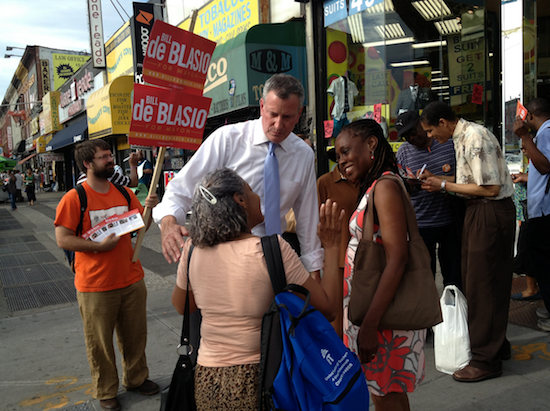De Blasio calls for Coney Island jobs plan
Says employment is key to recovery

The best recovery plan for Sandy-torn Coney Island would be a jobs program, according to mayoral candidate Bill de Blasio. “Recovery funds should be used to address inequities. Sandy hit some of our struggling neighborhoods,” he told the Brooklyn Daily Eagle.
Superstorm Sandy victims in Coney Island would have an easier time coping with the rebuilding effort in their community if they had jobs, de Blasio said.
The public advocate, who is one of several Democrats running in the September 10 primary, sat down with the Brooklyn Daily Eagle for a wide-ranging interview at his downtown Brooklyn campaign headquarters on July 12. The interviewed touched on Sandy recovery, the R train mess, and help for small businesses, among other topics.
De Blasio, 51,has served as the city’s public advocate since 2009. Prior to winning the post of public advocate, de Blasio was a city councilman representing Park Slope. He first won election to the council in 2001. “I have a statement to make!” he told a reporter as the interview started. “When is the last time a candidate for mayor had his campaign headquarters in Brooklyn?” he asked with a smile. He said it was very important to him to run his city-wide campaign out of his home borough.
De Blasio, whose poll numbers have just barely reached double digits, said he’s not a bit concerned about his poor showing in the polls so far. “People aren’t tuned in yet. People’s lives are busy. They’re not focusing on this race yet,” he said, expressing confidence that once the primary race reaches the home stretch in August and early September and voters begin paying attention, his poll numbers will move up. In a poll conducted by the Wall Street Journal, NBC News New York, and Marist College and released on June 25, only 10 percent of voters said they favored de Blasio.
Three of his rivals, City Council Speaker Christine Quinn, former congressman Anthony Weiner, and former comptroller Bill Thompson appear to be tied at the top of most polls.
De Blasio discussed Brooklyn-centered issues during the interview.
After the devastation of Hurricane Sandy, Coney Island is making a comeback with new shops and restaurants opening in the summertime playground, but things could be a lot better for the residents of that community, de Blasio said. “The minute you get away from the boardwalk, you see how different things are,” he said.
Apartment buildings in Coney Island operating under the jurisdiction of the city’s Department of Housing Preservation and Development were particularly hit hard, he said. He criticized the Bloomberg Administration’s handling of the recovery effort, particularly its mold removal. “It’s a health crisis. The administration had a cursory approach,” he said.
The public advocate said he supports the idea of establishing a ferry service between the Brooklyn Army Terminal pier and a pier near Wall Street to accommodate R train riders facing a transportation headache with the pending closure of the Montague Street Tunnel. He tunnel, which provides the link between Brooklyn and Manhattan for the R train, will be closed for 14 months starting in early August for repairs of damage caused by Superstorm Sandy. The R train in Brooklyn will only run as far as Court Street.
“The ferry makes a lot of sense,” de Blasio said. “Over 60,000 riders are going to be affected by the tunnel closing. If all of those people have to transfer to the 4 or 5 trains, it’ll make those trains more much more crowded. People will be like sardines. That’s unfair to them,” he said.
The Metropolitan Transportation Authority (MTA) isn’t helping, he said. “We haven’t heard a clear plan from the MTA that makes sense,” he said.
As a Park Slope councilman, de Blasio had a hand in the creation of a business improvement district on Fifth Avenue. Today, he has a mixed reaction to BIDs.
BIDs, which operate under the jurisdiction of the city’s Department of Small Business Services, have been championed by the Bloomberg Administration. They are private-public partnerships in which a group of property owners in a commercial area agree to pay a sum on top of their city real estate taxes into a fund. The fund raised by the property owners is then used to pay for amenities designed to bring more shoppers into the area and improve the local economy. BIDs have used their funds to pay for private security to make commercial streets safer and for private sanitation to keep streets clean and inviting.
“The core concept is good. I think they play a good role. They improve the environment and help businesses. But I don’t look at them uncritically. I’m not sure one-size-fits-all works,” de Blasio said.
